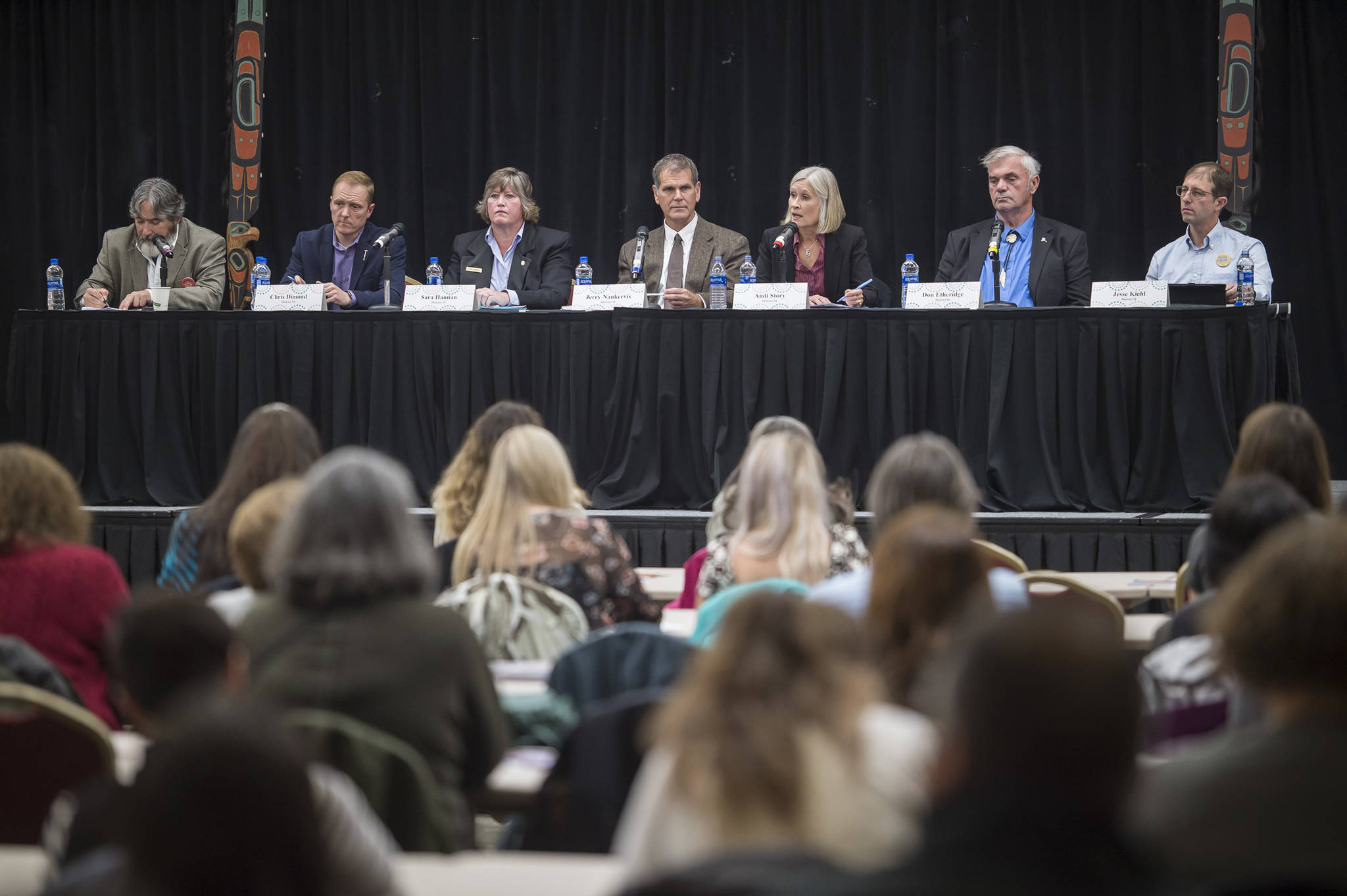Five of the six candidates running for Statehouse in northern Southeast agree that Alaska needs an income tax.
In Tuesday’s Get Out the Native Vote Southeast forum at Elizabeth Peratrovich Hall, candidates for House District 33, House District 34 and Senate District Q gathered to share their views with a crowd of approximately 120 people.
The event was moderated by Rep. Sam Kito III, D-Juneau and the incumbent in House District 33. Kito is not running for re-election, and neither are the other two incumbents in northern Southeast, Rep. Justin Parish, D-Juneau and Sen. Dennis Egan, D-Juneau.
Kito’s first question asked the candidates how they intend to balance Alaska’s budget deficit.
Independent Chris Dimond and Democrat Sara Hannan, each vying to replace Kito, said the state needs to find efficiencies, implement an income tax and continue to use a portion of the earnings of the Alaska Permanent Fund.
Dimond suggested that implementing an income tax is the best way to collect money from out-of-state workers.
“We’re losing a lot of payroll to out-of-state workers,” he said. “We all need to make sure we have skin in the game.”
Hannan said she believes using the Permanent Fund to balance the budget should be a last resort and she wants to see further reforms to the state’s system of oil taxes.
Democratic candidate Jesse Kiehl, who is seeking to replace Egan as the senator for northern Southeast, also said that he supports oil tax revisions and an income tax.
He does believe in using a portion of the Permanent Fund’s investment earnings to attack the deficit but wants to see the Permanent Fund Dividend constitutionally protected.
Don Etheridge, the independent facing Kiehl in the senate election, supports an income tax and using a portion of the Permanent Fund. He suggested the state might offer a tax credit for dividend-eligible Alaskans, allowing the income tax to fall more heavily on out-of-state workers.
House District 34 candidates Andi Story and Jerry Nankervis offered the largest fiscal-focused contrast. Nankervis, running as a Republican, said he supports using a portion of Permanent Fund earnings, “as did most legislators,” but said he believes the deficit can be solved through rebounding oil prices.
“At $72 a barrel, the budget balances,” he said.
According to figures from the nonpartisan Legislative Finance Division, Alaska’s projected $700 million deficit is eliminated if North Slope oil prices average $71 per barrel between July 1, 2018 and June 30, 2019.
So far, they’re averaging $75.64, according to Department of Revenue figures, 20.1 percent more than expected, but production has been 14.2 percent below expectations.
“It’s not good enough to just balance this current budget,” said Story, running as a Democrat.
Story said the state needs to be prepared to not just erase the deficit but make “strategic investments” in education, infrastructure, public safety and other programs.
According to the Legislative Finance Division, next year’s deficit is expected to be at least $200 million higher, and that’s without any increase in the Permanent Fund Dividend.
Asked about their plans for education, many of the candidates called for increases in school funding.
“We have not kept up with what we need in schools, and we need to spend more money in our schools,” Hannan said.
In this year’s legislative session, lawmakers agreed to a one-time school funding boost effective next year. Story said she wants to see that increase become permanent.
Kiehl said the Legislature has failed to keep pace with inflation and that local funding has hit its cap.
“We don’t have enough capacity at the city; the state has to take this on,” he said of funding increases.
Etheridge and Dimond each called for additional support for vocational-technical training and programs that aren’t geared specifically for college prep.
Nankervis did not express support for additional funding but said he supports a plan that would provide secure education funding in advance, easing the budget-setting process for school districts.
He cautioned that additional money is not always the answer.
“We can’t expect our school district to teach everything we need our kids to know … it has to come at home, and it has to come from the parents,” he said.
In another question, Kito asked the candidates what they will do to help rural communities that are struggling with high unemployment, crime, and drug and alcohol abuse.
All the candidates said listening to the problems of individual communities is critical to finding specific solutions.
“I think the main thing we need to do is listen to what they have to say,” Etheridge said.
Most candidates also said that the state’s ability to help with these and other matters will be limited unless the state fixes its fiscal problems.
“We can’t help with the treatment facility needs and educational needs and job needs … unless we have our fiscal house put together,” Dimond said.
• Contact reporter James Brooks at jbrooks@juneauempire.com or 523-2258.

